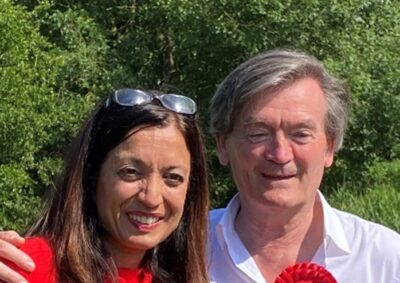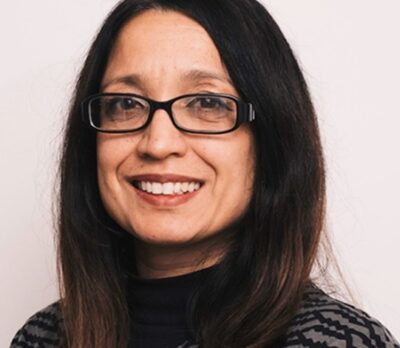January 16, 2025
Black Ocean Citizens: A Vision for Inclusive Marine Science
BY: Sophie Fresson
Topics: Sustainable Fishing
At Oceana UK, we believe in the power of diverse voices and experiences in ocean conservation. To explore this, we spoke with Dr Gurpreet Padda, a fisheries scientist by training now leading on evidence and evaluation programmes for the Marine Management Organisation, and a passionate advocate for inclusivity in ocean science. Gurpreet is the founder of the nonprofit Black Ocean Citizens, which is dedicated to addressing the systemic barriers that underrepresented communities face in accessing marine science careers for greater conservation and sustainability outcomes.
Q: What inspired you to create Black Ocean Citizens?
The turning point that led me to set up Black Ocean Citizens was attending a large conference and finding that Black, Asian and minority ethnic (BAME) representation was nearly non-existent – I could count visibly ethnically diverse attendees on one hand. I realised that the recruitment process often favours a particular demographic, and I wanted to change that for greater, more representative ocean governance decisions.
Q: Why do you think diversity is so critical in marine and fisheries sciences?
Diversity is crucial because it brings unique, often overlooked perspectives that are essential for solving environmental problems. And let’s face it, people of colour make up the majority of the global population. It makes me angry that there’s huge number of underserved people that are being excluded from environmental work and decisions that will ultimately affect them most.
In the UK, for example, people’s use of the sea tends to favour those with financial stability. This means coastal communities in deprived areas are often marginalised in discussions that affect their own livelihoods. If we’re to make meaningful progress in ocean conservation, we must include these voices in the conversation.
Q: Your work spans both ocean science and social justice. How do you see these intersecting?
Environmental justice focuses on how poorer or marginalised communities are more likely to experience environmental harms. I wanted to apply that to the UK through the lens of marine management in my PhD. Currently our marine and fisheries thinking is centred from an anglophile perspective. But we’re a global world so perhaps we need to think about global fisheries recognising all people from all backgrounds.
I think we need to unpack a lot of history around the concept of justice before we can press ahead with meaningful and just ocean conservation. When we approach conservation through this lens, we can begin to understand the different ways that communities view and interact with the ocean. By acknowledging concepts such as ‘recognition’ and ‘participation’ for example, we can create more inclusive conservation strategies that benefit everyone.

Q: Can you share more about your personal journey in the environmental sector?
I’m presented with new challenges each day, but my main one is navigating and influencing systemic failures that prevent people like me being part of this sector. I’ve been that person in boardrooms where initially people look at me as if I’m not supposed to be there. They either assume I’m very junior, or that I’m there to take coffee orders or empty the bins. So I make sure I shake everyone’s hand, look them in the eye and tell them my name. And eventually people take me seriously. But it’s mentally tough to have to constantly prove why I’m there. When I wake up in the morning, the first thing I think about is how my race and class is going to disadvantage me. However, I’m hoping through Black Ocean Citizens we will help change that for others coming up in this sector.
Q: What do you see as one of the biggest barriers for BAME people in the marine sector?
One of my biggest barriers in this sector is making sense of recruitment processes. I believe that many recruitment processes fall short of being truly inclusive on race, class and sometimes on ethical grounds. For example, the measure for being a competent employee is based on style or polish of how competencies are articulated, not whether the candidate can do the work. For example, I have been invited to interview because my CV and cover letter demonstrate how I juggle multiple tasks, but then at interview I haven’t articulated ‘how I have managed multiple tasks’ well enough. The interview preparation becomes less about achievement and more about flair with words.
Q: What advice do you have for young people from underrepresented backgrounds who want a career in marine science?
My advice is to seek out safe spaces where you can explore opportunities in ocean science without feeling like you have to fit a particular mould. I’m attending a careers fair next month, and I plan to start by asking students what they need from organisations like e-NGOs and government bodies to get involved. It’s important to approach this from the ground up – listening to young people and then giving them the support they need to succeed.
Q: What’s next for Black Ocean Citizens?
I’m hopeful that through our work we can achieve a future where diverse representation in ocean science and leadership has become the norm – where more ethnically diverse individuals and people from working-class backgrounds hold meaningful roles in marine science, research, and policy. Then I think I can rest in the knowledge that I may have played a part in inspiring the next generation of ocean scientists that truly reflects modern society.
The views expressed here are those of Dr Gurpreet Padda. To learn more about Black Ocean Citizens, visit www.blackoceancitizens.com.

